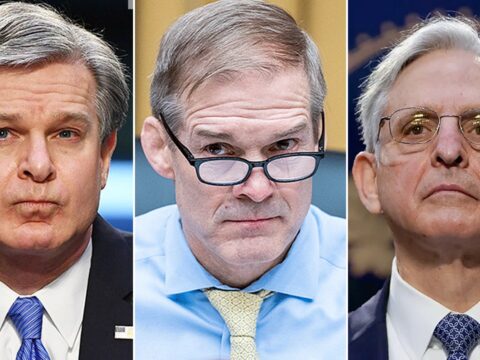Read this article for free! Plus get unlimited access to thousands of articles, videos and more with your free account! Please enter a valid email address. By entering your email, you are agreeing to Fox News Terms of Service and Privacy Policy, which includes our Notice of Financial Incentive. To access the content, check your email and follow the instructions provided.
Federal rules to stop “digital discrimination” could put telecommunications companies in the crosshairs, regardless of intent, according to free-market advocates.The Federal Communications Commission’s (FCC) rules are set to take effect in mid-January, even as a coalition of conservative and libertarian-leaning groups urged Congress to scrap the regulation in a December letter, warning that it will allow “leftist activists to shake down” private companies.The FCC action stems from the 2021 Bipartisan Infrastructure Law, which spends $65 billion to expand broadband access. The law also required the FCC to adopt rules to ensure equal high-speed broadband access, regardless of race, ethnicity, color, religion or national origin.FCC Chair Jessica Rosenworcel called the act the “first bipartisan civil rights law focused on the digital age.”DIVERSITY, EQUITY AND INCLUSION PROGRAMS TOOK A HIT IN 2023 FCC Chair Jessica Rosenworcel (Kevin Dietsch)”Congress was explicit — these rules have to ‘facilitate equal access to broadband.’ As part of this goal, Congress also told us we need to prevent and eliminate digital discrimination of access,” Rosenworcel said in a November statement after the commission approved the rules. “That means our rules would miss the mark if they cover just discriminatory intent because we would fall short of meeting our statutory obligation to ‘facilitate equal access’ to broadband.” She added, “As a result, we define digital discrimination to include disparate treatment and disparate impact.”The FCC rules define “digital discrimination” as “Policies or practices, not justified by genuine issues of technical or economic feasibility, that (1) differentially impact consumers’ access to broadband internet access service based on their income level, race, ethnicity, color, religion or national origin, or (2) are intended to have such differential impact.” Flipping the standard from disparate treatment to disparate impact creates opportunities for frivolous shakedowns, according to two dozen free-market groups in a Dec. 13 letter to members of Congress. Several free-market groups sent a letter to members of Congress, stating that the Federal Communications Commission “is out of control.” (Jabin Botsford)”Whereas longstanding precedent has held that the government or third-party plaintiffs would have to provide evidence of intentional discrimination on the part of a business for them to be held liable under Civil Rights law, now they must only demonstrate that different groups of people use the same service at different rates,” the letter says. “In the context of digital services, this will empower leftist activists to shake down any telecommunications company that tries to expand broadband to unserved areas under the threat of a lawsuit.”The letter was signed by heads and top staffers from Americans for Tax Reform, American Commitment, the American Consumer Institute, Digital First Project, Citizen Outreach, Frontiers of Freedom, Digital Liberty, the Innovation Economy Institute, the Competitive Enterprise Institute, the Open Competition Center, the Taxpayer Protection Alliance, the Foundation for American Innovation, the National Taxpayer Union, the Center for Individual Freedom, the James Madison Institute, the Consumer Choice Center, the Committee for Justice, the Property Rights Alliance, the Pelican Institute, the American Family Association, AFA Action, the Family Research Council, Advancing American Freedom, and the American Principles Project.FCC COMMISSIONER BLASTS BIDEN’S ‘DIGITAL EQUITY’ PLAN AS ‘UNLAWFUL POWER GRAB’The letter contends that the FCC is “out of control” and had used a one-page authorization in the infrastructure law to justify its 218 pages of new regulations to “enrich their activist friends.”The FCC will have enhanced power to regulate internet service providers on matters such as network maintenance, internet speed, late fees, pricing and mandatory arbitration. A telecommunications technician connects a grounding cable beside fiber optic lines. (Mike Blake)”As the branch of government most representative of and responsive to the people, Congress is tasked with protecting Americans from bureaucratic overreach and the economic devastation that may accompany it,” the letter to members of Congress continues. “We hope you will hold the FCC accountable for this power-grab and restore the rule of law, rather than the rule of lawfare, to internet service.”The FCC declined Fox News’ request for comment on the letter, but it referred to Rosenworcel’s statement about the digital discrimination standards. The rules were set to go into effect 60 days after the commission’s approval on Nov. 15, which passed on a 3-2 vote. The FCC can investigate possible instances of discrimination of broadband access, facilitate mediation or penalize companies for violating the rules. The FCC will review discrimination complaints from consumers through a new online portal.An FCC press release says, “The rules focus on the very real problem of outcome, such as when decisions untainted by discriminatory intent nevertheless cause different communities to receive different access to broadband services.” Miguel Cardona, U.S. secretary of education, and Jessica Rosenworcel, FCC chair (Arin Yoon)In the lead-up to developing the rules, the FCC established the Task Force to Prevent Digital Discrimination, which conducted public meetings in Baltimore, Los Angeles and Topeka, Kansas, among other locations.CLICK HERE TO GET THE FOX NEWS APP”We read the record from front to back. It demonstrated that there are gaps in access for low-income, rural, Tribal, and minority communities,” Rosenworcel said. “It showed that the digital divide often tracks the residential redlining that came into existence under the National Housing Act of 1934. It showed that many of the communities that lack adequate access to broadband today are the same areas that suffer from longstanding patterns of residential segregation and economic disadvantage.”



















